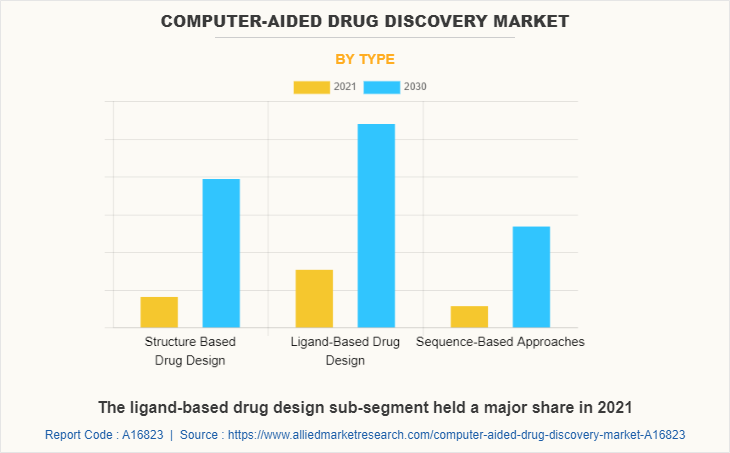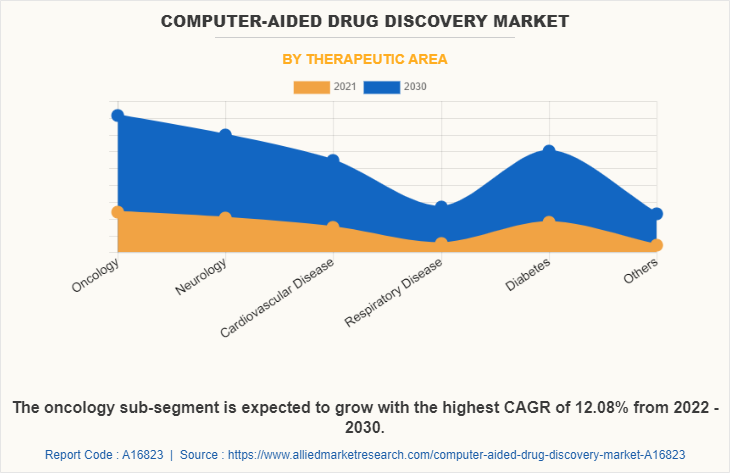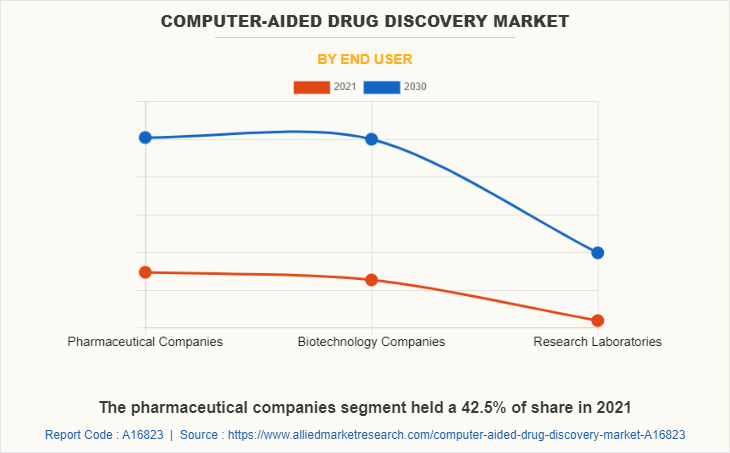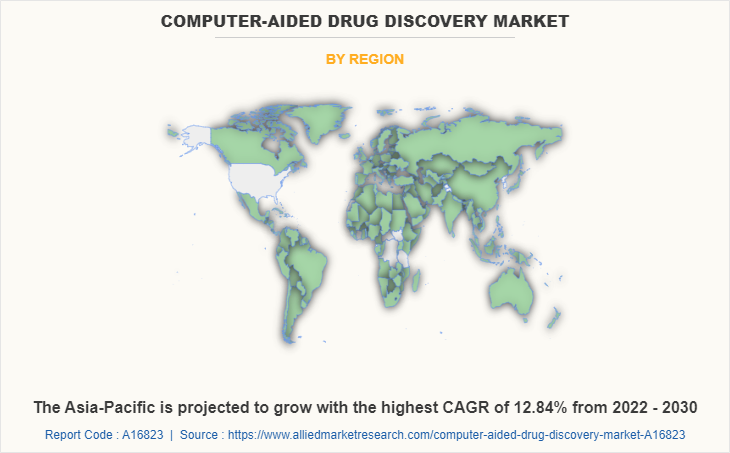Computer-Aided Drug Discovery Market Research, 2030
The global computer-aided drug discovery market size was $2.9 billion in 2021, and is projected to reach $7.5 billion by 2030, growing at a CAGR of 11.48% from 2022 to 2030.

The computer-aided drug discovery market is segmented into Type, Therapeutic Area and End User.
Computer-aided drug discovery (CADD) is a cutting-edge computational method for identifying and implementing potential leads in drug discovery. Computer-aided drug design encompasses computational chemistry, molecular modelling, molecular design, and rational drug design. CADD is being used to improve the quality of leads that have been identified. CADD methods are gaining acceptance and popularity in both academic and pharmaceutical circles. CADD saves time; it is quick and cheap.
Increased cases of chronic and unknown diseases are expected to accelerate the need for rapid drug development, propelling the computer-aided drug discovery market growth in the forecast timeframe. CADD is a modern technique in which researchers and analysts analyze, design, develop, monitor, and study a three-dimensional structure of the target disease molecule and its complement biomolecule ligand using a combination of software. This method is popular among researchers because it speeds up research and drug discovery. Strategic alliances among market players, combined with rising drug demand, are expected to propel the global market.
A shortage of skilled labor to operate computer-aided drug discovery solutions, on the other hand, may stymie the global market growth. Lower product penetration in emerging economies is also limiting the global drug discovery industry.
The global CADD market is segmented on the basis of type, therapeutic area, end-user, and region. By type, the market is classified into structure-based drug design (SBDD), ligand-based drug design (LBDD), and sequence-based approaches. By therapeutic area, the analysis has been divided into oncology, neurology, cardiovascular disease, respiratory disease, diabetes, and others. By end-user, the market has been divided into pharmaceutical companies, biotechnology companies, and research laboratories. By region, the market is analyzed across North America, Europe, Asia-Pacific, and LAMEA.
The key players profiled in this report include BOCSCI Inc., Bioduro-Sundia, Schrödinger, Inc., Aragen Life Sciences Pvt. Ltd., Aris Pharmaceuticals, Inc, Charles River Laboratories, Bayer AG, AstraZeneca, and Albany Molecular Research Inc. (AMRI).

By type, structure-based drug design sub-segment is projected to generate the fastest growth. The traditional method of drug discovery is structure-based drug design, which uses NMR, cryo-EM, and X-ray crystallography for compound optimization and design. Furthermore, technological advancements and rising demand for new drugs for various diseases are some of the driving factors for structure-based drug design type of computer-aided drug discovery in the global market over the forecast period.

By therapeutic area, oncology sub-segment is expected to have a dominant share during the forecast period. Oncology is a medical specialty that deals with treatment, prevention, and diagnosis of cancer. There are various types of cancer, and determining the type of medication required for a specific cancer is a complicated process. Despite extensive research, cancer treatment has been one of the major concerns around the world due to medication resistance. As a result, there is a surge in demand for cancer drugs that are efficient and cost-effective. These key elements have the potential to accelerate segment growth during the forecast period.

By end user, pharmaceutical companies sub-segment is expected to have the dominant share during the forecast period. The pharmaceutical companies sub-segment of the computer-aided drug discovery market is expected to grow at a significant CAGR during the forecast period and generate significant revenue. Various approaches have been used in recent years to identify chemical compounds that need to be developed and marketed. In recent years, 5,000-10,000 drugs have been subjected to laboratory testing before being approved for human use. To develop or discover new drugs, the overall protocol can take up to ten years or more. In the analysis timeframe, such factors are expected to boost the adoption of CADD in the pharmaceutical companies sector.

By region, the rapidly increasing number of cancer cases in the United States is expected to boost computer-aided drug discovery market revenue. Cancer is one of the few and most dangerous medical conditions for which there is no cure. In the United States, the disease's prevalence is increasing at an alarming rate. The National Cancer Institute, for example, predicted that on September 25, 2020, 1,806,590 new cancer cases would be diagnosed, with nearly 606,520 people dying from the disease. The use of computer-aided drug discovery in the search for a cancer cure has grown.
KEY BENEFITS FOR STAKEHOLDERS
- The report provides an in-depth analysis of the global computer-aided drug discovery market trends along with the current and future market forecast.
- The report provides a computer-aided drug discovery market forecast from 2022 - 2030 and computer-aided drug discovery market share for each segment, region, and country(s).
- This report highlights the computer-aided drug discovery market opportunities, market drivers, and restraints with the impact analyses during the forecast period.
- Porter’s five forces analysis helps analyze the potential of the buyers & suppliers and the competitive scenario of the global computer-aided drug discovery market for strategy building.
- A comprehensive global computer-aided drug discovery market analysis covers factors that drive and restrain the market growth.
- The qualitative data in this report aims on market dynamics, trends, and developments.
IMPACT OF COVID-19 ON THE GLOBAL COMPUTER-AIDED DRUG DISCOVERY MARKET
- Despite the fact that the novel coronavirus pandemic had a devastating effect on several industries, the computer-aided drug discovery market grew significantly during this time.
- Because of increased R&D activities among scientists, researchers, biotechnological and biopharmaceutical companies to limit the spread of the coronavirus disease, the market for computer-aided drug discovery has grown at a faster rate.
- The increasing transmutation rate of coronavirus has motivated scientists worldwide to develop an effective treatment or drug against this lethal virus. As a result, the importance of research and drug discovery has skyrocketed, driving market growth.
- Because of the coronavirus pandemic in 2020, many companies have improved their technology sector by investing a large portion of their revenue in research and development. Some businesses have used partnerships and collaboration to expand their market presence.
Computer-Aided Drug Discovery Market Report Highlights
| Aspects | Details |
| By Type |
|
| By Therapeutic Area |
|
| By End User |
|
| By Region |
|
| Key Market Players | Schrödinger, Inc., Bayer AG, Bioduro-Sundia, AstraZeneca plc, Albany Molecular Research Inc. (AMRI), BOC Sciences, Aris Pharmaceuticals, Inc., charles river laboratories, Aragen Life Sciences Pvt. Ltd. |
Analyst Review
The global computer-aided drug discovery industry is expanding rapidly owing primarily to the increased use of artificial intelligence in drug discovery for drug screening, chemical synthesis, polypharmacology, and studying the three-dimensional structure of molecules. Furthermore, artificial intelligence has created numerous opportunities for companies to enter the market and use AI technology in conjunction with computer-aided drug discovery. There is increasing demand for rapid drug development for various diseases such as cancer which in turn is expected to drive the market of computer-aided drug discovery. Key players working in computer-aided drug discovery market are following notable strategies such as product innovation along with strategic tie-ups in order to grow worldwide. Asia-Pacific is projected to register faster growth as compared to North American and European markets.
The market for computer-aided drug discovery is expected to grow due to increased research activities. As the number of chronic diseases has increased, so has the need for an appropriate treatment option. In addition, the growing number of unknown diseases has increased research and experimentation. Computer-aided drug discovery aids in the study, analysis, and monitoring of the interaction between the target biological molecule and its biomolecule ligand. It also aids in drug development and is a very cost-effective and time-consuming approach. These factors are expected to drive the computer-aided drug discovery market in the forecast timeframe
Agreement, business expansion, and product launch are the key growth strategies of global computer-aided drug discovery market players.
Asia-Pacific will provide more business opportunities for global Computer-aided drug discovery market in the future.
BOCSCI Inc., Bioduro-Sundia, Schrödinger, Inc., Aragen Life Sciences Pvt. Ltd., Aris Pharmaceuticals, Inc, Charles River Laboratories, Bayer AG, AstraZeneca, and Albany Molecular Research Inc. (AMRI). are the leading market players active in the Computer-aided drug discovery market.
Oncology segment held the maximum share of the global computer-aided drug discovery market in 2021
Pharmaceutical companies, biotechnology companies, and research laboratories include the major customers of global Computer-aided drug discovery market
The report provides an extensive qualitative and quantitative analysis of the current trends and future estimations of the global Computer-aided drug discovery market from 2021 to 2030 to determine the prevailing opportunities.
Government funding for drug development using computer-aided software is expected to boost market growth in the near future. Furthermore, increasing artificial intelligence integration with computer aided drug discovery is expected to increase market share in the global computer aided drug discovery market.
The growing demand for in-depth research on biomolecules and their interactions with specific target molecules has created numerous opportunities for market participants to increase their market revenue in the computer-aided drug discovery market. Pharmaceutical and biotech companies have established their global presence through collaborations and partnerships with key players in the artificial intelligence and computer aided drug discovery fields, which will ultimately accelerate the global computer-aided drug discovery market growth in the next few years.
Loading Table Of Content...



